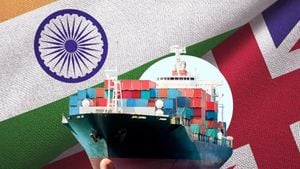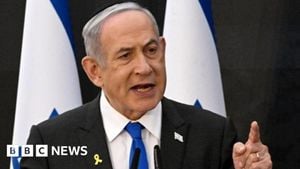Prime Minister Narendra Modi’s visit to Guyana on November 20, 2024, marks a significant chapter in the history of India-Guyana relations. It is the first visit by an Indian head of state to this Caribbean nation in more than half a century, representing not just diplomacy but also deep-rooted cultural connections. Modi's arrival symbolizes India’s growing interest and investment in the Caribbean, particularly as Guyana emerges as one of the fastest-growing economies worldwide, primarily driven by its burgeoning oil industry.
Upon landing at the Cheddi Jagan International Airport, Modi was greeted by President Irfaan Ali and Prime Minister Mark Anthony Phillips, alongside various dignitaries and cabinet ministers. The warm welcome is indicative of the strong ties and mutual respect shared between the two nations. The atmosphere was nothing short of jubilant, as the leaders exchanged pleasantries, showcasing the growing warmth between India and Guyana.
It was not just protocol; there were heartfelt gestures as well. The Mayor of Georgetown bestowed Modi with the "Key to the City," which is more than just ceremonial; it symbolizes the strengthening of diplomatic and cultural ties. Modi expressed his gratitude on social media, stating, "Landed in Guyana a short time ago. Gratitude to President Dr. Irfaan Ali, PM Mark Anthony Phillips, and senior ministers for the warm welcome. I believe this visit will deepen the friendship between our nations."
This historical visit is not simply about formalities. It aims to explore multiple avenues for cooperation. With Guyana's rapidly growing economy bolstered by substantial oil reserves, India sees significant potential for collaboration across sectors like defence, energy, infrastructure, and trade. Modi's visit emphasizes not just economic ties, but also cultural connections—particularly with the Indian diaspora, which forms about 40% of Guyana's total population.
The Indian community, tracing its roots back over 180 years as indentured labourers, plays a pivotal role in the fabric of Guyanese society. Modi’s interactions with this community during his visit accentuate the shared heritage and the continuing contributions of Indo-Guyanese to their homeland. Addressing the community, he expressed admiration for their achievements and their enduring connection with India.
This visit also includes talks with Guyanese President Irfaan Ali. The agenda covers pressing issues such as energy cooperation, trade, regional security, and even educational partnerships. The potential for India to assist Guyana with its energy needs is particularly timely, as India continuously seeks to diversify its energy sources and capabilities.
Further solidifying the importance of this trip, Modi is scheduled to address the Guyanese Parliament—a significant honor and acknowledgment of the deepening bilateral relations. His speech is anticipated to touch upon themes of strategic collaboration rooted in shared values, culture, and heritage.
One of the key focal points of this visit is the second India-CARICOM Summit, where leaders from Caribbean nations will convene to discuss cooperation on various issues like climate change, economic development, and energy security. Modi’s participation reflects India’s commitment to building stronger ties with Caribbean nations, especially concerning global challenges pinning down developing countries.
Underpinning the visit is the broader diplomatic agenda following Modi’s earlier stops in Brazil and Nigeria. The backdrop of the G20 Summit, where Modi championed the causes of the Global South—such as food security and climate change—reinforces India's leadership on global issues facing developing nations.
Looking toward future partnerships, both nations are eager to explore opportunities for collaboration beyond just governmental discussions. The pathways for cooperation could lead to investments, joint ventures, cultural exchanges, and educational initiatives, all benefiting the societies involved. Guyana's strategic geographical placement and abundant natural resources greatly appeal to India, which aims to bolster its foreign policy across the Caribbean.
Conclusively, Modi’s visit to Guyana is not just about reconnecting with the Indian diaspora and strengthening diplomatic ties; it symbolizes the start of new economic partnerships and cultural exchanges. The historical significance of this visit opens avenues for friendship rooted deep within shared histories and aspirations, propelling both nations toward collaborative futures built on mutual respect and growth.



